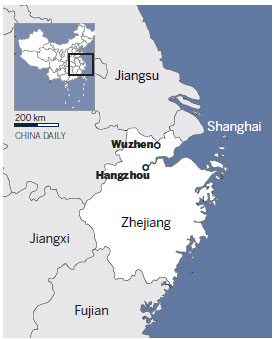|
Rivers have been the lifeline of Wuzhen for centuries. The ancient water town in Zhejiang province is now a big draw for tourists with its unique charm that blends the old and the new. Photos by Xinhua |
An ancient Chinese town of waterways has turned into a modern tourist destination, Yan Yiqi reports in Wuzhen, Zhejiang province.
Located some 80 kilometers from Hangzhou city, capital of East China's Zhejiang province, the ancient town of Wuzhen has been known as the land of "fish and rice" for more than 1,000 years.
With its splendid and extensive waterways, Wuzhen, which is on the Yangtze River Delta, served as a transport and business hub centuries ago, linking Hangzhou to neighboring Suzhou city and Shanghai in the south. People from nearby places used to row their boats to Wuzhen to sell vegetables and meat in the town market.
Since the laying of its foundation stone in AD 872, Wuzhen hasn't changed its name. The town still has many canals and its traditional buildings have withstood the ravages of time. Its well-preserved architecture combined with the availability of modern services has turned Wuzhen into a tourist destination for Chinese and foreigners today.
Wuzhen is divided into four main areas by its waterways. The south and north are inhabited by local residents, while the east and west boast many tourist spots. Spring and autumn are the best seasons to visit Wuzhen. The weather is pleasant and the flowers are in full bloom.
But visiting the town during Chinese New Year in late January or early February will also fascinate visitors.
Steeped in tradition, the town witnesses many customs during the country's most celebrated festival. They include hanging foods such as salted pork, sausages and salted duck from the windows of people's homes, and lining up tables along the riverbank to host tourists to meals.

Wuzhen also provides modern amenities such as round-the-clock free Wi-Fi access.
Main draws
The Ancient Bed Museum is China's first of its kind devoted to the collection and display of antique beds. It is located in eastern Wuzhen. Visitors will find examples of regional-style beds, with the oldest dating back to the Ming Dynasty (1368-1644).
With two large exhibition halls, the museum displays nearly 100 beds, reflective of the tastes and styles of their times.
The exhibits range from beautifully decorated beds for the wealthy in the olden days to simple wooden bunks for workers. The museum offers visitors glimpses of life in ancient China.
Wuzhen has a long history of producing alcohol. There were more than 20 distilleries in the town in the 14th and 15th centuries.
Gaogongsheng Distillery is the only old distillery still operating. First founded as a purveyor of pickled food in the 1360s, it produces Sanbai, a famous liquor that pleases the palate with its soft, lasting mellowness. It was presented to guests at the coronation of Zhu Yuanzhang, the first emperor of the Ming Dynasty in 1368.
The distillery today is just a retail store and a production facility, where the daily output is about 200 liters.
Wuzhen is also among the places of origin of indigo dyeing in China. The Indigo Fabric Workshop was founded in the town's south during the 13th century. Now it serves as both the production base and distribution center for indigo-dyed cloth in Wuzhen. Visitors can watch the complete process and buy souvenirs from a shop.
Across the street from the workshop is a small weaving factory where some local women roll out cottonseeds, spin yarn and weave. Visiting both units will enable visitors better understand fabric production and coloring.
A water market is located in the town's west, covering an area of about 3,400 square meters. It is divided into two by a bridge. Here, vendors sell fruits, vegetables and meat on boats, from sunrise to nightfall.
Tourists who stay in guesthouses nearby can shop for vegetables and meat from the market and learn to cook local dishes from the owners of the lodges.
Getting there
Wuzhen doesn't have a train station or airport, given its connection by water in the past. But visitors can take buses to the town from Shanghai Pudong International Airport, Shanghai Hongqiao Airport and Hangzhou Xiaoshan International Airport. There is a train station in Tongxiang, a city located 13 km from Wuzhen.
Direct buses to Wuzhen are available from Shanghai and cities in Zhejiang province. Driving from Shanghai to Wuzhen along the highway takes about 80 minutes, and it is some 60 minutes by road from Hangzhou to the town.
Walking and taking boat rides are the best ways to explore Wuzhen.
Luxury hotels, hostels and lodges are all available. It is highly recommended that visitors stay in guesthouses run by local residents on the riverfront to experience the town in all its authentic glory. The guesthouses are scattered along both banks of the river, with more than 300 rooms available to tourists.
Although the guesthouses have their individual styles for interiors, they all bear the regional elements of the Yangtze River Delta.
Contact the writer at yanyiqi@chinadaily.com.cn
|
A visit to the water market is a good way to experience the local lifestyle in Wuzhen. |
|
Local opera performances attract tourists and locals alike. |